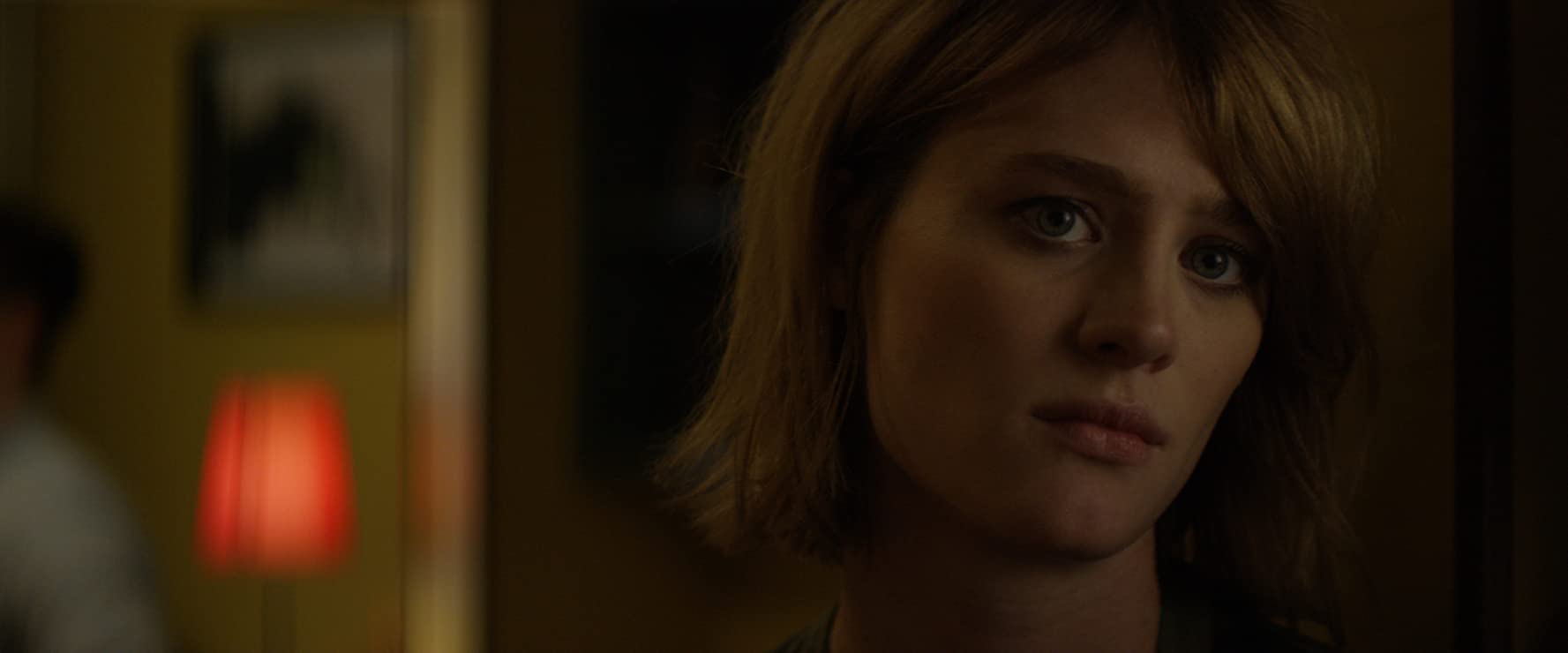
By Emad El-Din Aysha, PhD
I have written an article a long time ago about a horror-SF movie I watched largely against my will, Dark Skies (2013), which fits into my longstanding research on sexual anxieties and alien abduction scenarios. I’d been thinking of writing a follow-up for some time now after watching that hilarious Ben Stiller movie The Watch (2012), a sci-fi, horror comedy on the related topic of alien invasions. And in the US these subtle conquests always seem to happen in small town America, for some reason.
I’d dithered then found this news snippet about a prospective comedy alien invasion movie and decided the time was ripe after all for that overdue follow up – Zehra Phelan, “Nicholas Hoult, Jon Hamm, Mackenzie Davis and more join sci-fi comedy ‘Alpha Gang’”, HeyUGuys, 19 June 2020. Apparently Alpha Gang is about aliens disguised as human beings, with a massive invasion plan, but human emotions intrude, probably on account of having to mimic human beings too closely. Don’t know if it’s set in small town America as well but I suspect not given the international cast, including Charlotte Gainsbourg (France), Steven Yeun (Korea), Mackenzie Davis (Canada) and Sofia Boutella (Algeria). There are some hints of two older Dan Aykroyd comedies here – My Stepmother is an Alien (1988) and Coneheads (1993) – but I suspect Alpha Gang will be more serious given the stellar cast and the emotional subject-matter. Love may very well be the cure to humankind’s ills and the thing that bridges the alien-human gap. You never know. In all cases, I’d love to see how the alien agenda is mutating in American popular art in what I hope is the post, post-9/11 era of cultural reconciliation now that we have so common causes, stretching from COVID-19 to the police brutality-racism crisis in the US.

I was also hankering to write a follow-up to my Terminator: Dark Fate article on the male gaze, given that Fatima Bhutto’s talk about the latest failures of American pop culture had touched, as well, on the movie Joker. (I’ve reviewed it on these illustrious pages, I’m proud to say). It was her distinct impression that the character of the Joker was the latest example of the crisis of the white man. So, more cannon fodder for yet another follow-up!!
Watch Out, Boys on Patrol
The Watch is about suburban America’s obsession with neighbourhood watch and, wouldn’t you know it, there’s an alien invasion going on involving aliens disguised as human beings. Ben Stiller, a man in charge of a department store, calls for the formation of a neighbourhood watch group after one of his (Mexican) employees is skinned alive by a mysterious assailant. Turns out the aliens are housed underneath the department store and they steal people’s skin to disguise themselves, which makes Ben Stiller and his motley crew of heroes extra paranoid in typical post-9/11 mode. And, wouldn’t you know it, one of his own crew is an alien himself, interestingly played by an Indian looking dude with a British accent and Muslim sounding name, and someone who has a taste for East Asian women. (In actual fact the actor, Richard Ayoade, is half-Nigerian, half-Scandinavian; another smart move on Ben Stiller’s part). The nefarious character, however, is won over by the human spirit – thanks to an orgy, in fact – and switches sides, a clear reference to integration and overcoming so-called terrorist or alien ideological-cultural threats.
Notice that the Mexican guy who gets killed in the beginning got killed on the same day that he was going to become an American citizen. Kudus again to Ben Stiller. Still, that’s only the half of it. The bigger theme underlying all this is gender, masculinity more specifically, and with that a little homophobia. The neighbourhood watch crew all have ‘problems’ of some manly-related nature. Ben Stiller’s character has a lovely and considerate wife (Rosemarie DeWitt, the most wholesomely sexy actress since Melinda Dillon, and Blythe Danner) that’s he’s failed repeatedly to impregnate.[1] As a consequence he throws himself into community politics. Hence the neighbourhood watch scheme, just another excuse to pursue his manly duties elsewhere. In one of the nicest scenes in the movie you have Ben Stiller’s character confessing these problems to the most brash, boyish, immature character in the movie, played to perfection by Vince Vaughn, and he tells Ben Stiller that he has to own up to this problem with his wife. Being a real man means not keeping your loved ones in the dark. Vince’s character has got problems of his own given that he’s practically a househusband, his wife making the real money, while his daughter is growing up way too quickly and posting her romantic plans on facebook, with a creepy teenager dude who beats up her dad when he tries to protect his daughter’s virginity. (Like that’s a crime!)

As you can guess, the pushy boyfriend turns out to be an alien himself, and daddy dearest can only kill him by tearing off his ‘manhood’. That’s the one weak spot of the aliens. That’s real masculinity in a nutshell, leading by example by exposing who isn’t a real man, instead of interfering in your daughter’s emotional life which the (stupid) law won’t let you do. There’s also Jonah Hill, a very talented comedian and actor, whose character has to live with his mother and can’t get a proper job or join the cops, his ultimate dream. (The cops aren’t terribly manly themselves, being underpaid and understaffed, and undertrained and underintelligent, and Jonah Hill gets the upper hand in the end).
So clearly all these guys have masculinity issues and playing at being the town’s self-appointed protectors helps them overcome these problems, apart from the disguised alien dude in the group of course. In a penultimate scene Ben Stiller tells his wife what’s wrong with him and how he hid it from her, afraid she’d leave him, and she says she doesn’t care because she loves him and – nicer still – wants to be his best buddy because he’s such a civically committed dude. But, more importantly, there’s a sexuality angle here that may not be entirely evident to all. Stiller’s character freaks out at one point when a new neighbour shows up. He ‘appears’ to be checking him out and when he asks Stiller’s character if he’s married, he says yes, and to a woman no less. Later you learn that the peeping tom type neighbour is actually recruiting suitable candidates for his sex parties, so there’s nothing of a non-straight nature going on. But the guy does creep you out, with his slick black hair and effeminate persona, and that’s despite the fact that in the opening sequence you see Stiller’s character massaging or being massaged by a guy – he’s a championship runner. So he’s not homophobic at all he just goes on the defensive, sexually, when a stranger shows up behaving weirdly in a way you might not find friendly. And the watch group also mistakenly think he’s one of those disguised aliens.
This all connects back into, if you pardon the phrase, alien abduction scenarios and problems men specifically are facing in the America of today, stretching from insecurity in the job market to problems in the bedroom because how tired women are as breadwinners to political paranoia about Washington DC, mega corporations and Third World superpowers. Not to mention 9/11 paranoia, as if that wasn’t enough, and the more usual paranoia Americans have about their next door neighbours – from satanic cults (The Burbs) to axe murderers (Disturbia). All evident, again, in Dark Skies. Now to get to Fatima Bhutto and do some more stitching up of one of those stubborn war wounds that just won’t heal!
When was the Male Whimper
I loved Joker, needless to say, and don’t see it as some sort of male anxiety movie. Nonetheless, Fatima Bhutto caught onto something very true in American cinema and popular culture. Men, white men specifically, are embattled. The question is why and ‘when’ did they find themselves in this fix.

Recollecting Dark Skies and the hairstyle of the elder son who gets abducted, I’d say the 1970s and the whole flower power, Hippie generation. The 1970s was the beginning of the end, the last time men could have fun in the US when they were young, secure that they had a better economic future ahead of them. It was in this era that the post-war boom economy came to an end in the US. It’s also roughly when women entered the job market in force, leading to the deluge of action movies in the 1980s as a safe substitute for embattled men – to cite Arnold Schwarzenegger himself. It’s also, critically, when homosexuality began to be accepted and black Americans got into the job market too. The white man is quite literally under siege and from all corners. (Do I look like I’m complaining? Serves him right, stealing our women from under us. So much for the ‘white man’s burden’!!)
I’d watched many a movie over the years that practically scream this in your face but not being an American I couldn’t place it in context. Watch creepy corporate and political paranoia thriller The Parallax View (1974) and you have a scene where Warren Beatty’s character is in a bar and asks for a glass of milk (a reformed alcoholic) and gets picked on by a deputy sheriff for not drinking a manly drink. What does he say? Don’t touch me unless you love me. The brainwashing sequence in the movie, at the Parallax corporation, also has the nation’s protectors (cops and politicians) portrayed in hinted at drag. LBJ in particular is portrayed as a troubled father figure who needs your help to face off the failure in Vietnam and the race riots of his day. More substantive and informative is the heartbreaking Cutter’s Way (1981), with the dearly departed John Heard as a Vietnam vet missing an arm. In one key scene he explains how there’s nothing left for him but the pursuit of money – he’s blackmailing a tycoon who murdered a teenage girl – saying that, after the war, it’s not enough only to not believe in God or hat your country. That wears off soon when you realise that ultimately you’re hungry and don’t have any money. In the opening sequence you have Jeff Bridges in a hotel room, after having sex with a woman, and she’s the one who pays him off. Again, implying that economic circumstances are not so good for men anymore to the point that men become emasculated and have to fend like women though selling their bodies.
In another indicative scene, at a bar, Cutter (John Heard’s character) is talking to some African American guys and wondering if they should be called blacks or African Americans or Negros or something like that and Jeff Bridge’s tells him to keep his mouth shut lest they get killed. Later Cutter has to put up with Jeff Bridge’s character doing it with his wife because he’s no longer a man so to speak, and can only rough her up. I’d say this is a more of a turning point movie than that because the whole way American masculinity was perceived changed. Gone are the days of Frank Sinatra and Gene Kelly, where a man could be broad shoulder, have fought in the Korean War, and sing and dance and be suave and sophisticated all at the same time. It doesn’t pay to be a gentleman anymore and seems American men are leaving that heritage behind because they see it as properly belonging to the gay community, disassociating themselves and also trying to make themselves feel more manly in a era going against them economically and otherwise. By contrast, black and Hispanic men can dance all they like and see it as a hundred percent consistent with manliness.

Here’s another race linkup, the movie Taxi Driver (1976). In the original script written by Paul Schrader the pimp character played by Harvey Keitel wasn’t white but black, and Paul Schrader has been accused of racism before, as in the movie Blue Collar (1978). I wouldn’t accuse him of that personally but I guess he’s got ‘issues’, sexual anxieties, like lots of white men and more so in his case given that he had sexuality problems growing up and running away from a religious household – see Hardcore (1979) and American Gigolo (1980). Still, a brilliant director and human psychologist.
Another indicative-informative work of art from this period was an annoying story I’d read once in a fantasy and SF book, amazingly enough – “San Diego Lightfoot Sue” (1975) by Tom Reamy. It’s about some farm boy who runs away to San Diego and ends up mixing with transvestites, homosexuals and prostitutes, without even knowing it given his hick yokel background. In the end, having lost his prostitute sweetheart he has to hitch up with one of his estranged brothers and witnesses him, very much like you see with Jeff Bridges, posing nude for a man, although he isn’t gay himself. As for the hero, he ends up doing it with both sexes because it no longer means anything to him anymore, his own body, without his first love-sexual experience, Lightfoot Sue. What I was shocked to find, as an Arabic reader, is how insecure, alienated, rootless and physically ‘superfluous’ – passive recipients of what’s going on around them, if you get what I mean – many American men ‘feel’ themselves to be. That’s what happens when you’re economically insecure and socially uprooted and grew up feeling neglected by your source of security (his father in this case) and live in a world of uncertainty about everything, from gender to sexuality and back again.
This all brings us back to alien abduction scenarios and the distinct sexual angle that targets men predominantly, namely, rectal probes which is just a psychological substitute for being ‘shafted’ at the workplace or in politics. (Don’t believe me, watch Joe Versus the Volcano, Gran Torino and even 2001: A Space Travesty. Never mind all the male anxiety stuff you see in Road Trip, Eurotrip, the “Spanish Fly” episode of Beavis & Butthead and Harold & Kumar Go to White Castle, and before them all The Catcher in the Rye).
Alien abduction scenarios have been part of the post-war flying saucer scare from the very beginning but the aliens were always benign and interested in showing off their civilisation and technology to the human abductees. They also looked thoroughly alien, with multiple eyes or green or red skin or antenna, the kind of stupid fickle way we portray aliens in cartoons and children’s stories. More than that, such benign abductions have always been part of folk lore the world round, from fairies in European mythology to genies in Arabic history. But the sexual angle came later, much later, let alone the foetus-like look of the so-called greys.
I’d watched an interview once of Carl Sagan complaining about the sudden notion that people were being sexually abused by aliens, and he’d been debunking these visitation accounts since the Barney and Betty Hill story and Project Bluebook. So, again the transition period was the 1970s-80s where you get these distinctly looking aliens with Asian slit eyes and oversized heads and grey to yellow skin. This was the period where the Americans were extricating themselves from Vietnam and then having to put up with the Japanese making inroads into their economy and buying large chunks of it too – the era that bequeathed us techno-Orientalism and Japanophobia. Check out Max Headroom, William Gibson and even mainstream stuff like Black Rain and Rising Sun, full of white man’s anxiety about everything from industrialism to sushi-saké sex to Karaoke.
It was also in this period, to recollect the work of literature-language professor Marie Lathers, that the word ‘alien’ took on its SF connotation in the 1970s, again. Previously the word extraterrestrial was used, while alien was a strictly political term.[2] Not just illegal alien, that term we all know, but ‘alien nation’, originally a term used to designate Mexicans and then adopted for the movie Alien Nation (1988).[3] Read or watch Soviet science fiction and you will find the word extraterrestrial. Watch older American SF and you will find that the word alien isn’t used – it’s always creature, being, thing – and even after the 1970s you still have the word ET being used in everything from movies like E.T. (1982) to TV series like CHIPS (“The Spaceman Made Me Do It”, Season 6, Episode 3). And, wouldn’t you know, she’s argued that the movie that started or at least signalled the trend was the classic, classic horror sci-fi flick Alien (1979), and sex is a central if not the central theme there. Movie historians themselves have noted how Inseminoid (1981) – talked about it before – was part of a small wave of sexually-themed horror-SF movies, along with Alien, which is indicative that sexual anxiety was a talking point at the time. (Watch 12 Monkeys and you have a killer virus, tapping into anxieties about AIDS possibly coming from a monkey). In the process, the older political usage of alien, referring to strangers and illegal aliens and immigrants, got subconsciously lumped in with this new scientised usage, and both sets of usages and anxieties have sexual connotations in their own right. Losing your job, if you’re a man, is a tremendously down-putting thing, if you get what I mean, never mind if you lose it to a foreigner who’s shorter than you and yet can steal your girlfriend because he makes more money. I’d also wager that these sexual anxieties about forceful insemination are older than we think, at least when it comes to women. I’d watched the intro sequence to a horror movie once, thinking it was a SF movie, and the ‘scenario’ you saw in the sequence (it was in silhouette) was almost identical to an alien investigation-invasion of the subject’s body with a needle and a probe.
Then it turned out to be some satanic cult horror flick, of the cheesy cheap kind. Moreover, the actress who gets inseminated in Inseminoid, Judy Geeson, was also in a satanic cult-type movie The Lords of Salem (2012) with a sexual scene with a girl on rock slab surrounded by guys. It makes it look like she’s getting ready for a medical examination of an intimate kind. Remember how gendered, sexist Medieval thought was replete with such notions as demon seed and having carnal knowledge of the devil and fertility cults and occult virgin sacrifices?
A Passage into Softy Space
Weirder still, Judy Geeson’s the actress from To Sir with Love; talk about ‘alien’ attachments. You don’t think they were ‘hinting’ at anything, do you?!
In short, this is a psychological-cultural-political minefield and it needs to be exploded – or is that mindfield? – sooner rather than later. If Alpha Group can do this – I assume the term is a reference to ‘advance guard’ – with its top notch international cast and light hearted approach to problems we all share around the globe, then all the better. I personally can’t wait, especially since the similarly themed My Stepmother is an Alien wasn’t that good, to be honest. Especially compared to The Watch, boyish antics and toilet humour notwithstanding.

Who could think that, Ben Stiller outweighing Kim Basinger? That’s a travesty, if not a sex crime, with all due respect to Ben Stiller super cool liberal dude that he is. Thank heavens for Rosemarie DeWitt.
Oh, and Mackenzie Davis of course of course!!!!
NOTES:
[1] Melinda Dillon started out as the passive housewife in Bound for Glory (1976) only to turn into the bisexual cheating wife in Paul Newman’s Slap Shot (1977). The key to her persona is that she chooses to be wholesome; nobody forces her, as in Nightbreaker (1989), which makes her all the more attractive. Oh, and I have a sneaking suspicion Ben Stiller likes Blythe Danner, a whole lot, given the comments Gaylord Focker makes about her in Meet the Fockers.
[2] For more on Marie Lathers please see her courageous book Space Oddities: Women and Outer Space in Popular Film and Culture, 1960-2000 (2010), and my essay “Alien Abduction Scenarios, Through a Gendered Lens: Crisis of the White Man’s Burden?”, in Geek Out! II: Queer Pop Lit, Art & Ideas, 2019. I’d struggled to get the essay published in a ‘straight’ publication to no avail. Perhaps I disturbed them too much. It seems it’s not enough to be straight anymore!
[3] I’d first encountered Marie Lathers at the American University in Cairo when she gave a seminar lecture entitled “Aliens, Arabs, and Women: The Colonization of Outer Space in Popular Culture”, New Cairo Campus, 31 March 2009. Next to the aforementioned movie there was also the TV series I Dream of Jeannie, pitting magic and the East against science and the West, with the female lumped in with the Orient while outward exploration is the exclusive remit of pioneering, frontier-type Western men. It was at that lecture that I pitched my outlandish Asian thesis, figuring it out during the talk, and got a nifty endorsement from her too!







[…] for another follow-up, or set of follow-ups, after making the damnable mistake of watching Bernardo Bertolucci’s […]
[…] overlapped with each other in all sorts of bizarre and unexpected ways. For someone like me who is in love with follow-ups, I just couldn’t […]